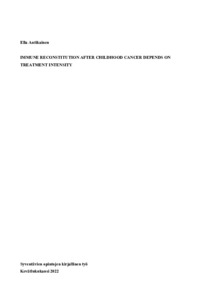IMMUNE RECONSTITUTION AFTER CHILDHOOD CANCER DEPENDS ON TREATMENT INTENSITY
Antikainen, Ella (2022-05-17)
IMMUNE RECONSTITUTION AFTER CHILDHOOD CANCER DEPENDS ON TREATMENT INTENSITY
Antikainen, Ella
(17.05.2022)
Julkaisu on tekijänoikeussäännösten alainen. Teosta voi lukea ja tulostaa henkilökohtaista käyttöä varten. Käyttö kaupallisiin tarkoituksiin on kielletty.
avoin
Julkaisun pysyvä osoite on:
https://urn.fi/URN:NBN:fi-fe2022051937036
https://urn.fi/URN:NBN:fi-fe2022051937036
Tiivistelmä
The aim of this study was to analyze immune reconstitution in the pediatric population after completion of cancer treatment. We retrospectively studied all children (N=79) who had been treated for cancer at our center in Turku University Hospital starting treatment during the years 2014-2019. In a separate dataset we merged all leukemia patients who started treatment during the years 2014-2019 including all high-risk leukemia patients treated between 2009-2019 (N=39). Patients were classified in high risk and low risk treatment intensity groups based on a previously validated tool ITR-3. We collected data on baseline parameters, treatment-related aspects and post- treatment immunological recovery, namely neutrophil and lymphocyte counts, immunoglobulin levels, CD19, CD4 and NK cell counts. Immunological parameters were followed until their normalization.
Our data showed a fast recovery of the above-named immunological parameters for the majority of current pediatric oncologic treatments. Treatment for high-risk leukemia, AML, medulloblastoma and mature B-cell lymphoma was associated with prolonged recovery times for a substantial proportion of cases. These patients with prolonged recovery time were mostly classified within the higher ITR-3 group, which means slower immune reconstitution can be anticipated for certain treatment groups.
According to our study, as childhood cancer treatment protocols have advanced to be less toxic, they also often cause less immunosuppression. This means that post-treatment transmission-based precautions would not be needed in most cases. Nevertheless, patients treated with high intensity treatment need special follow-up after completion of childhood cancer treatment.
Our data showed a fast recovery of the above-named immunological parameters for the majority of current pediatric oncologic treatments. Treatment for high-risk leukemia, AML, medulloblastoma and mature B-cell lymphoma was associated with prolonged recovery times for a substantial proportion of cases. These patients with prolonged recovery time were mostly classified within the higher ITR-3 group, which means slower immune reconstitution can be anticipated for certain treatment groups.
According to our study, as childhood cancer treatment protocols have advanced to be less toxic, they also often cause less immunosuppression. This means that post-treatment transmission-based precautions would not be needed in most cases. Nevertheless, patients treated with high intensity treatment need special follow-up after completion of childhood cancer treatment.
